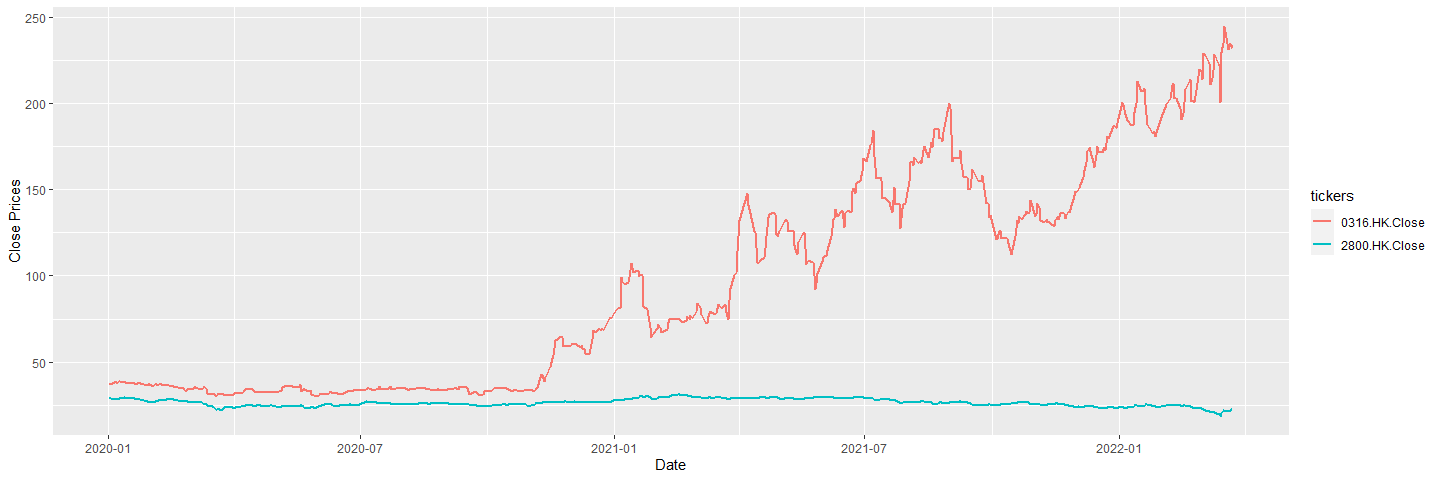iyeung144.github.io
My Github Pages
Hong Kong Stock 5
by Yeung Ka Ming, CFA
Summary
OOCL is a shipping company and the performance during the pandemic is extraordinary.
R Libraries
library(quantmod)
library(tidyverse)
library(ggplot2)
Preparation of data
Direct download by getSymbols
tickers <- c('0316.HK','2800.HK')
hkport <- new.env()
getSymbols(tickers,
env=hkport,
src = "yahoo",
index.class = "POSIXct",
from = "2020-01-01")
## [1] "0316.HK" "2800.HK"
# auto.assign is FALSE, so an environment is used here.
# Unlike US stocks, # the tickers in HK stock market is
# by number, which cannot be the variable
# name in R. Further fine tune in next step.
OHLC price
head(Ad(hkport$`0316.HK`))
## 0316.HK.Adjusted
## 2020-01-02 29.70684
## 2020-01-03 29.15525
## 2020-01-06 30.61301
## 2020-01-07 29.94323
## 2020-01-08 29.78563
## 2020-01-09 30.88880
head(Cl(hkport$`0316.HK`))
## 0316.HK.Close
## 2020-01-02 37.70
## 2020-01-03 37.00
## 2020-01-06 38.85
## 2020-01-07 38.00
## 2020-01-08 37.80
## 2020-01-09 39.20
head(Op(hkport$`0316.HK`))
## 0316.HK.Open
## 2020-01-02 37.80
## 2020-01-03 37.65
## 2020-01-06 37.05
## 2020-01-07 37.65
## 2020-01-08 37.65
## 2020-01-09 38.45
head(Hi(hkport$`0316.HK`))
## 0316.HK.High
## 2020-01-02 37.80
## 2020-01-03 37.80
## 2020-01-06 39.45
## 2020-01-07 38.75
## 2020-01-08 39.35
## 2020-01-09 39.20
head(Lo(hkport$`0316.HK`))
## 0316.HK.Low
## 2020-01-02 37.75
## 2020-01-03 37.00
## 2020-01-06 37.05
## 2020-01-07 37.65
## 2020-01-08 37.65
## 2020-01-09 37.60
Prepare a dataframe with all adjusted close prices
Prepare dataframe
## To get all the close prices
## into a single xts object
cl.stocks.xts <- Reduce(merge,eapply(hkport, Cl))
colnames(cl.stocks.xts) <- sub('X','',colnames(cl.stocks.xts))
cl.stocks.tbl <- as_tibble(fortify(cl.stocks.xts))
cl.stocks.long.tbl <- cl.stocks.tbl %>%
pivot_longer(!Index,
names_to = "tickers",
values_to = "Close.Prices")
cl.stocks.long.tbl
## # A tibble: 1,102 x 3
## Index tickers Close.Prices
## <dttm> <chr> <dbl>
## 1 2020-01-02 00:00:00 0316.HK.Close 37.7
## 2 2020-01-02 00:00:00 2800.HK.Close 28.7
## 3 2020-01-03 00:00:00 0316.HK.Close 37
## 4 2020-01-03 00:00:00 2800.HK.Close 28.6
## 5 2020-01-06 00:00:00 0316.HK.Close 38.8
## 6 2020-01-06 00:00:00 2800.HK.Close 28.5
## 7 2020-01-07 00:00:00 0316.HK.Close 38
## 8 2020-01-07 00:00:00 2800.HK.Close 28.5
## 9 2020-01-08 00:00:00 0316.HK.Close 37.8
## 10 2020-01-08 00:00:00 2800.HK.Close 28.2
## # ... with 1,092 more rows
Plot graph
p4 <- ggplot(cl.stocks.long.tbl,
aes(x = Index,
y = Close.Prices,
color=tickers))
p4 +
geom_line(size = 1) +
xlab("Date") +
ylab("Close Prices")
